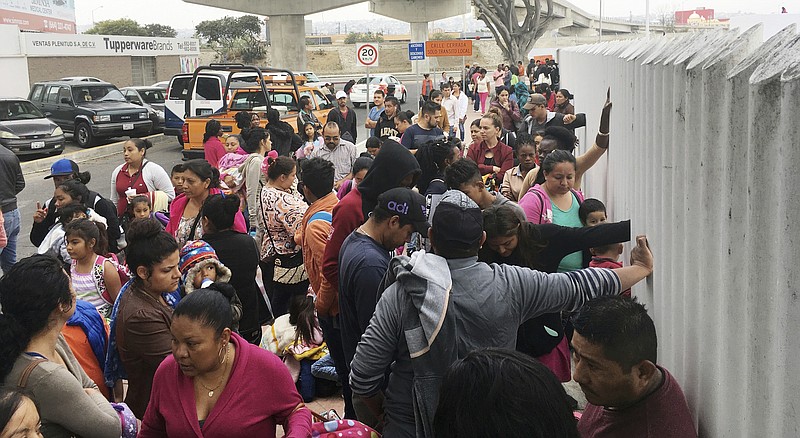TIJUANA, Mexico (AP) - Undaunted by President Donald Trump's tough talk on immigration, asylum-seekers are forming unusually long lines at the Mexican border, with parents and children sleeping on cardboard in the sweltering heat and waiting for days or even weeks to present themselves to U.S. inspectors.
Wait times of a few hours or longer are not uncommon at the border. But the backlogs that have developed over the past several weeks at crossings in California, Arizona and Texas - and people sleeping out in the open for days at a time - are rare.
Telma Ramirez made the trip from El Salvador to seek asylum in the U.S. She arrived at the border in Tijuana with her 5-year-old son and year-old daughter, only to find a crush of others ahead of her.
The 27-year-old mother kept checking in at the border crossing to see if civilian volunteers were close to calling their numbers, in a scene that resembled the host station at a crowded restaurant.
Finally, on the 20th day, Ramirez made it to the front of the line.
"You must come every day to see if it's your turn. If you don't come, you'll lose your place in line," Ramirez said.
The exact reasons for the bottleneck are unclear. But the U.S. has been seeing a surge in requests for asylum over the past few years.
A top Homeland Security Department official told lawmakers last month that new asylum filings tripled between 2014 and 2017 to nearly 142,000, the highest level in more than 20 years.
The official, Francis Cissna, director of U.S. Citizenship and Immigration Services, said the asylum backlog stood at 318,000 cases.
U.S. Customs and Border Protection said in a statement that any waits in Mexico are expected to be temporary. It said the number of people the agency can take depends on such factors as detention space, complexity of cases, translation requirements, medical needs and traffic at the crossing.
Some advocates insist the administration has enough resources to avoid the delays and is dragging its feet to discourage people from trying to come across.
The Trump administration has declared a new "zero-tolerance" policy of prosecuting every immigrant arrested for illegal entry, a practice that is separating parents from their children. Asylum-seekers who turn themselves in to border inspectors usually do not face such a fate.
At the Hidalgo, Texas, border crossing, parents and children sleep on cardboard on a bridge separating the two countries, waiting for U.S. authorities to signal their time has come, according to volunteers bringing them food and water.
Lawyers said asylum-seekers at the Nogales, Arizona, crossing are camping out for up for five days to make a claim.
Across from San Diego, more than 100 asylum-seekers gathered Monday in a large plaza at the Tijuana side of the nation's busiest border crossing, alongside pushcart vendors selling oatmeal, tamales, burritos and smoothies. Families whose numbers aren't called return to Tijuana migrant shelters to pass the time.
Volunteer Carlos Salio told them the wait is about three weeks.
Salio consulted his tattered notebook of people who left their names with him, calling them out when their turn came.
When U.S. authorities said 50 would be allowed to claim asylum that day, Salio encouraged people to go back to their shelters.
"Everyone knows that when your number is close, you better be here," he told the crowd, many of them women with young children.

